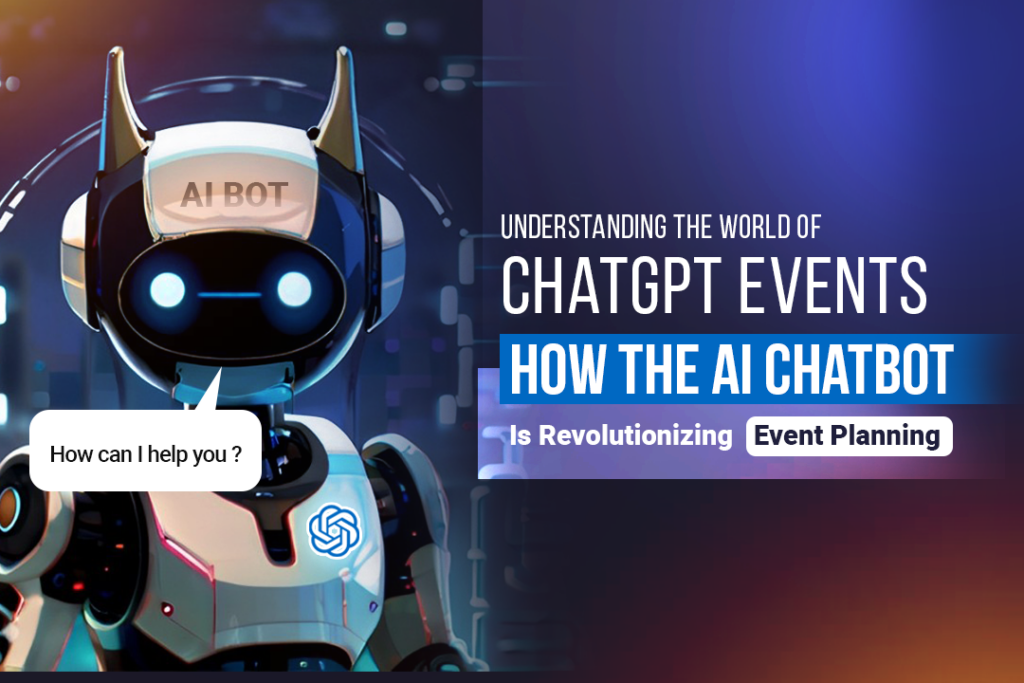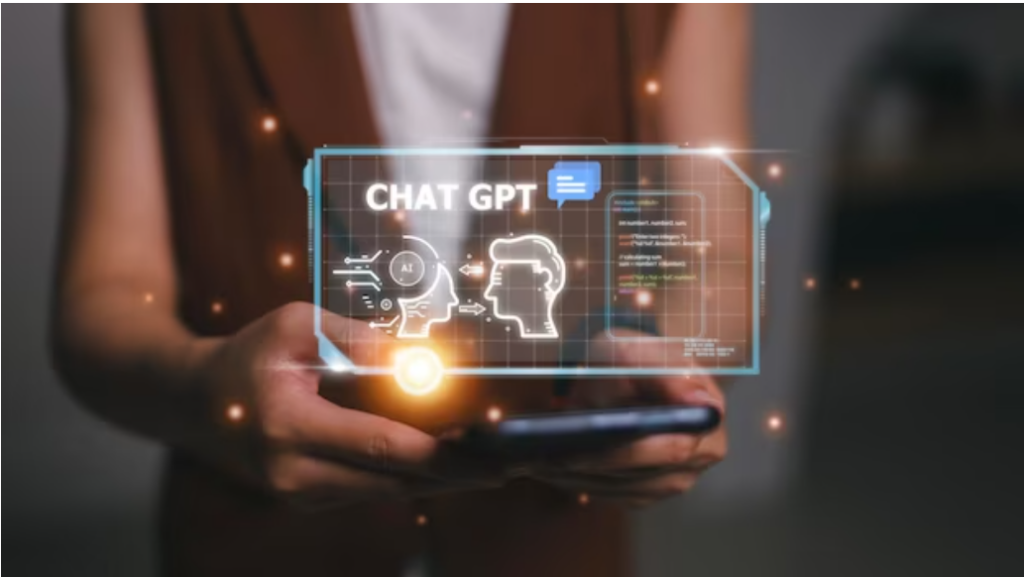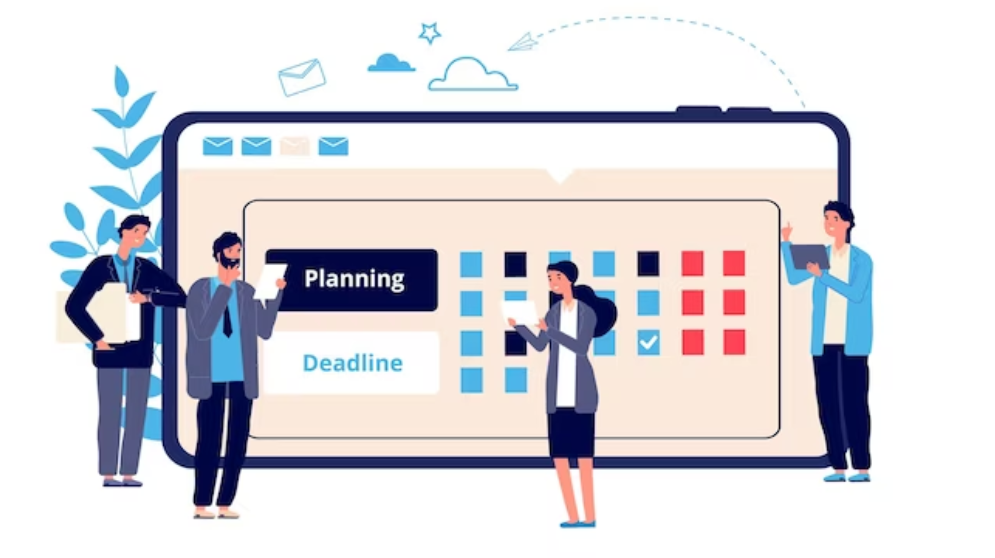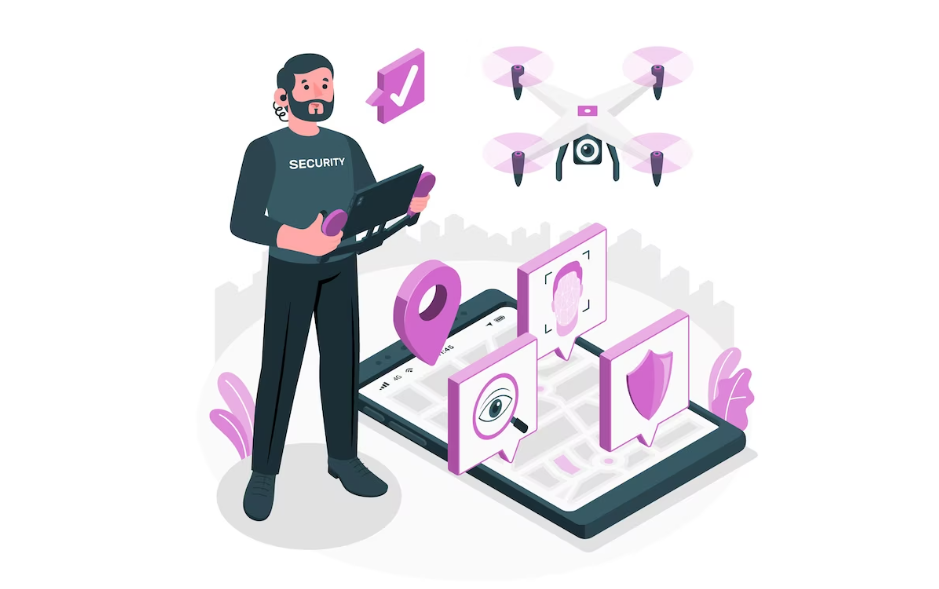
The era of ChatGPT Events involves using the power of Artificial Intelligence (AI) chatbots to transform event planning as we know it. It involves seamlessly coordinating successful events, fostering real-time interactions, and delivering personalized attendee experiences that have become effortless tasks.
This article takes you on a journey through the remarkable ways in which ChatGPT is revolutionizing the event planning landscape, providing event professionals with ease, spontaneity, efficiency, insights, and engagement while giving participants the best attendee experience.
How is ChatGPT Revolutionizing Event Planning?
ChatGPT, an advanced language model, employs artificial intelligence and deep learning techniques to process and comprehend natural language effectively. This grants it the ability to analyze and understand human text, allowing it to grasp the subtle nuances and context present in various sentences and queries.
One of the most remarkable features of ChatGPT is its capacity to generate responses that closely resemble human language. This is made possible by its extensive exposure to a vast amount of textual data during its training phase, honing its ability to provide coherent and contextually relevant replies. As a result, interactions with ChatGPT feel remarkably natural and engaging, greatly enhancing the overall user experience.

Moreover, ChatGPT exhibits an extraordinary adaptability to diverse contexts. It possesses the versatility to handle a wide range of topics, from event-related inquiries to general information and even creative writing. This exceptional flexibility positions ChatGPT as an invaluable tool for event planning and event management, enabling it to undertake various crucial tasks, such as answering attendees’ questions, disseminating event particulars, offering responsive customer support, and much more.
ChatGPT’s key strengths lie in its profound understanding of natural language, its capacity to generate responses that closely resemble human conversation and its seamless adaptability to different contexts. These qualities make it a game-changing asset in event planning, revolutionizing how organizers interact with event attendees and streamlining numerous aspects of event management.
Here are some of the ways in which ChatGPT is revolutionizing event planning:
1. Optimizing Event Registrations and Attendee Experience
AI chatbots like ChatGPT can effectively streamline the event registration process and enhance the overall attendee experience through personalized interactions and real-time assistance. Let’s look at how it helps event planning in detail below:
i) Streamlining the Event Registration Process
ChatGPT can significantly simplify the event registration process for potential attendees. Instead of navigating through lengthy forms or multiple web pages, users can interact with the chatbot directly through a chat interface. The chatbot can guide them through the registration process step by step, asking relevant questions and providing instant responses to queries. This reduces the friction in registration, making it a quicker and more convenient experience for potential event attendees.

Pic Courtesy: Freepik
ii) Indulging in Interactive Engagement with Potential Attendees
ChatGPT is designed to engage users in natural language conversations. It is a great way to research engagement strategies. When potential attendees interact with the chatbot, they can ask questions about the event, its schedule, speakers, location, or any other relevant information. The chatbot can provide real-time answers based on its extensive knowledge base, ensuring that attendees get accurate and up-to-date information. This interactive engagement creates a more personalized and human-like experience, fostering a positive impression of the event.
iii) Providing Real-Time Assistance and Support
During the registration process, attendees may encounter doubts or encounter technical issues. AI chatbots like ChatGPT excel in providing instant support and assistance. Whether it’s addressing common queries or resolving specific issues, the chatbot is available 24/7, ensuring attendees receive timely help regardless of their time zone or location. This level of real-time support enhances attendee satisfaction and reduces the burden on event organizers’ support teams.
iv) Providing Personalized Recommendations
ChatGPT can leverage user data to offer personalized event recommendations. The chatbot can suggest relevant sessions, workshops, or networking opportunities that align with the attendees’ interests by analyzing users’ preferences, previous interactions, and past event attendance history. This personalized approach enhances the value of the event for each individual, making them feel more valued while increasing the likelihood of their attendance.
v) Leveraging Seamless Integration with Other Platforms
ChatGPT API can seamlessly integrate with other event management tools and platforms, such as event registration systems, ticketing platforms, and social media. This integration ensures a smooth flow of information between different channels, enabling the chatbot to access up-to-date event details, ticket sales, registration status, and attendee data. This enhances the chatbot’s ability to provide accurate information and improves the overall event management process for organizers.
Leveraging ChatGPT for event registration and attendee experience optimization can significantly impact event planning. It increases attendee engagement and satisfaction by providing a user-friendly, interactive, and personalized registration process. Their real-time support and seamless integration with other platforms make them indispensable tools for event organizers looking to enhance the overall attendee experience and revolutionize how events are planned and executed.
2. Automating Event Communication and Engagement
ChatGPT can facilitate seamless and efficient communication with event attendees, both before and after the event, and enhance engagement during the event itself. This automation enhances the overall event experience for attendees and provides valuable insights to event organizers for continuous improvement.
Here’s a more detailed explanation of this concept:
i) Pre-Event Communication
ChatGPT can be employed to automate communication before an event. This involves sending out reminders, invitations, and logistical information to attendees. For example, the chatbot can handle inquiries about the event schedule, venue directions, registration details, and any pre-event preparations, reducing the workload on event organizers.
ii) Personalized Assistance

ChatGPT can provide personalized assistance to attendees by answering their queries and guiding them through event-related information. Attendees might have questions about session timings, speakers, networking opportunities, etc. The chatbot can provide instant responses, offering a seamless experience and reducing the need for attendees to wait for manual responses.
iii) Engagement During the Event
ChatGPT can facilitate real-time engagement once the event begins. Attendees can interact with the chatbot to access information about ongoing sessions, panel discussions, workshops, and other activities. The chatbot can act as a digital assistant, providing instant updates and helping attendees navigate the event smoothly.
iv) Interactive Q&A Sessions
ChatGPT can be integrated into Q&A sessions. Attendees can submit their questions to the chatbot, which can then organize and present them to speakers or panelists. This can enhance the efficiency of Q&A sessions and ensure that a diverse range of questions is addressed.
v) Collecting Feedback
After each session or the event as a whole, ChatGPT can collect feedback from attendees. This feedback can include opinions about the content, speakers, event logistics, and overall experience. Gathering feedback through the chatbot can be more convenient for attendees and organizers alike.
vi) Post-Event Follow-Up
Once the event concludes, ChatGPT can continue to engage attendees. It can send out thank-you messages, provide links to presentation materials, and offer additional resources related to the event. This follow-up communication helps maintain the connection with attendees and keeps the event’s impact alive.
vii) Data Analysis
Additionally, ChatGPT can gather valuable data about attendee interactions, preferences, and interests throughout the event. This data can be analyzed to gain insights into attendee behavior, enabling event planners to make informed decisions for future events, such as refining event content, adjusting schedules, and enhancing engagement strategies.
3. Creating Engaging Event Content and Optimizing the Event Agenda
ChatGPT’s capabilities in content generation, data analysis, engagement strategies, and personalization can significantly contribute to creating engaging event content and optimizing the event agenda. Leveraging AI-powered insights and recommendations can help event planners curate an agenda that resonates with attendees, keep them engaged, and deliver a memorable experience. Here’s how:
i) Content Generation
a. Speaker Introductions and Bios: ChatGPT can assist in crafting compelling introductions and biographies for speakers. Analyzing available information and adding creative flair can set the tone for each session and build anticipation.
b. Session Descriptions: Writing informative and intriguing session descriptions is crucial for attracting attendees. ChatGPT can generate concise and engaging descriptions highlighting the key takeaways, ensuring attendees are well-informed about the content.
c. Promotional Material: ChatGPT can create promotional content such as social media content, emails, event themes, and event website copy that entices potential attendees to register and participate. Its ability to adapt its tone and style can help capture the event’s essence and target different target audience segments effectively.
ii) Agenda Optimization
a. Content Alignment: ChatGPT can assist in aligning content to create a coherent and valuable experience by analyzing the event’s goals, target audience, and available speakers. It can suggest the order of sessions to ensure a logical flow and progression throughout the event.

b. Diverse Content: ChatGPT can help ensure a balanced mix of content types, such as keynotes, panels, workshops, and interactive sessions. It can identify potential gaps and recommend specific topics or formats to diversify the agenda.
c. Timing and Pacing: Optimizing session durations and scheduling breaks is crucial for maintaining attendee engagement. ChatGPT can analyze the complexity and interactivity of sessions to suggest appropriate time slots and ensure balanced pacing.
iii) Audience Engagement
a. Polls and Surveys: ChatGPT can assist in designing polls and surveys that collect valuable insights from attendees. These engagement tools can be strategically placed throughout the agenda to gauge attendees’ opinions, interests, and satisfaction in real-time.
b. Interactive Elements: Based on its understanding of conversational engagement, ChatGPT can recommend interactive elements such as live Q&A sessions, audience participation, and real-time discussions. These elements foster attendee involvement and enrich the event experience.
c. Gamification: To enhance engagement levels, ChatGPT can suggest gamification strategies like quizzes, challenges, and rewards. This adds an element of fun and competition, motivating attendees to participate and interact with the content actively.
iv) Dynamic Adjustments
a. Real-time Feedback Analysis: ChatGPT can process real-time feedback from attendees and identify trends or concerns. This data can guide event organizers and event marketers in making on-the-fly adjustments to the agenda, addressing attendee needs promptly.
b. Session Improvements: After analyzing attendee interactions, ChatGPT can recommend adjusting session formats, content delivery, or engagement strategies to ensure sessions remain captivating and informative.
v) Personalization
a. Tailored Recommendations: ChatGPT can analyze attendee profiles, preferences, and past interactions to suggest personalized sessions and workshops. This level of customization enhances attendee satisfaction and ensures they find the event content relevant.
b. Post-Event Follow-up: ChatGPT can assist in crafting post-event content such as thank-you notes, follow-up emails, and resources based on each attendee’s interests. This personalized approach maintains engagement even after the event concludes.
4. Enhancing Event Security and Safety Measures
ChatGPT’s role in event security and safety is multi-faceted. It helps communicate vital information to attendees, facilitate emergency responses, assist with reporting and queries, and collect data for ongoing improvement. Leveraging AI-driven communication and assistance can help event organizers create a safer environment that fosters attendee trust and ensures their well-being throughout the event.

Pic Courtesy: Freepik
Here’s a detailed explanation of its role:
i) Pre-Event Preparation:
a. Safety Guidelines: ChatGPT can disseminate important safety guidelines and instructions to attendees before the event. This includes information about security procedures, emergency exits, evacuation plans, and prohibited items. Providing clear instructions in advance helps attendees understand their roles in ensuring safety.
b. COVID-19 Protocols: In the context of the ongoing pandemic, ChatGPT can convey relevant health and safety protocols, such as mask requirements, social distancing guidelines, and vaccination information. It can address attendee concerns and provide up-to-date information based on the latest health guidelines.
ii) Real-Time Communication During the Event
a. Emergency Alerts: In case of emergencies, ChatGPT can quickly broadcast alerts to attendees through various communication channels. This can include information about evacuation procedures, shelter locations, and other safety instructions.
b. Crisis Management: ChatGPT can guide attendees on appropriate actions to take in critical situations like natural disasters or security threats. It can provide information on staying safe, locating emergency services, and following official directives.
c. Medical Assistance: Attendees can use ChatGPT to request medical assistance or report medical incidents. ChatGPT can guide them on finding first aid stations, medical personnel, and emergency medical procedures.
iii) Security Queries and Concerns:
a. Reporting Suspicious Activities: Attendees can communicate with ChatGPT to report any suspicious activities they notice during the event. The chatbot can guide them on what information to provide and how to contact event security discreetly.
b. Lost and Found: ChatGPT can assist attendees in locating lost items or reporting lost belongings to security personnel. This feature helps maintain a secure environment by preventing unattended items from being considered threats.
iv) Data Collection for Continuous Improvement:
a. Incident Reports: ChatGPT can collect incident reports from attendees, including details about safety concerns or incidents they witnessed. This data can be aggregated to identify patterns and improve security measures for future events.
b. Attendee Feedback: ChatGPT can gather feedback on attendees’ perceptions of safety and security measures post-event. This information helps event organizers refine their safety protocols and address any areas of concern.
5. Gathering and Analyzing Valuable Data from Event Interactions
ChatGPT can gather and analyze valuable data from event interactions by processing attendee conversations, sentiments, preferences, and feedback. This data-driven approach enhances event planning, content curation, and engagement strategies, leading to more successful and engaging events in the future.
Here’s a detailed explanation of how ChatGPT can help in this process:
i) Data Gathering
a. Attendee Interactions: ChatGPT interacts with attendees throughout the event, collecting a wealth of data from conversations, queries, and feedback. This data includes attendee preferences, interests, questions, and opinions about various aspects of the event.
b. Polls and Surveys: ChatGPT can facilitate polls and surveys by presenting questions to attendees and recording their responses. These polls can cover topics such as session satisfaction, content relevance, and overall event experience.
c. Q&A Sessions: During Q&A sessions, attendees can submit questions to ChatGPT. The chatbot records these questions, which can provide insights into the topics that resonate most with the audience.
ii) Data Analysis
a. Sentiment Analysis: ChatGPT can analyze the sentiment of attendee interactions to gauge overall satisfaction and identify areas of concern. Positive, neutral, or negative sentiments can help organizers understand attendees’ sentiments about specific sessions or aspects of the event.
b. Content Analysis: Analyzing the types of questions and topics discussed can help ChatGPT to provide insights into attendees’ interests and preferences. Organizers can use this information to tailor content for future events.
c. Trends and Patterns: ChatGPT can identify recurring event themes, keywords, and patterns in attendee interactions. This information highlights popular topics and enables organizers to address emerging trends.

Pic Courtesy: Freepik
iii) Personalization
a. Attendee Profiles: ChatGPT can use collected data to create attendee profiles based on preferences and interactions. This information can help personalize future event recommendations and offerings.
b. Customized Suggestions: ChatGPT can offer session recommendations based on an attendee’s past interactions and interests. This enhances attendee engagement by ensuring they receive content that aligns with their preferences.
iv) Post-Event Insights
a. Attendee Feedback Analysis: ChatGPT can analyze post-event feedback and opinions shared by attendees. This helps organizers understand what worked well and areas that need improvement for future events.
b. Session Effectiveness: Assessing the popularity of sessions, the types of questions asked, and attendee engagement levels, ChatGPT can provide insights into the effectiveness of different sessions and formats.
v) Data Visualization
a. Reporting: ChatGPT can generate reports and visualizations summarizing the collected data. These reports provide a comprehensive view of attendee interactions, sentiments, preferences, and feedback.
b. Insights Dashboard: Organizers can access an insights dashboard powered by ChatGPT. This dashboard showcases real-time and post-event analysis, making it easier to make informed decisions based on attendee interactions. Doing this also helps in executing predictive analytics for the forthcoming events.
vi) Future Event Planning
a. Content Curation: The data collected and analyzed by ChatGPT guides the curation of content for future events. Organizers can prioritize topics that generate high engagement and address areas of concern.
b. Engagement Strategies: Insights from attendee interactions can inform engagement strategies, helping organizers design activities, interactive sessions, and networking opportunities that align with attendee interests.
Key Takeaway
In the ever-evolving innovation landscape, AI chatbots, led by pioneers like ChatGPT, stand out as transformative forces within event planning. They have reshaped the paradigm of organizing and experiencing events, leaving an indelible mark across every phase of preparation.
This journey has unveiled the diverse roles that ChatGPT plays in revolutionizing event planning. From automating communication and enhancing security to personalizing interactions and drawing data-driven insights, its impact is evident as a catalyst for change. Embracing this cutting-edge technology will help event organizers unlock unprecedented efficiency, channeling resources toward crafting memorable experiences. Attendees are seamlessly guided through tailored journeys while organizers glean insights that pave the way for continuous improvement.
AI chatbots’ resonance in event planning showcases the harmony of human ingenuity and technology. With ChatGPT, events transcend their traditional boundaries, becoming immersive narratives of connection, engagement, and inspiration. The stage is set for event planners to harness this potential, redefine the essence of gatherings, and shape a future where extraordinary experiences are the norm. This is the evolution of event planning, led by ChatGPT’s remarkable strides. If you want to know more about the role of artificial intelligence in the event industry, read our article, “The Rise of AI in Events: How Artificial Intelligence is Reshaping the Industry.”




Comments are closed.